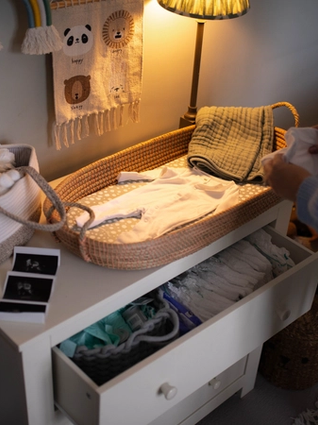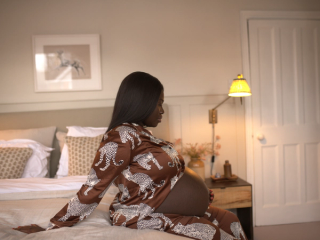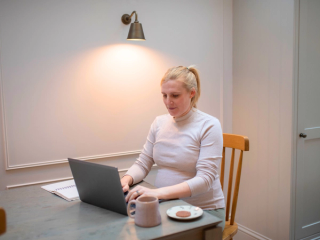
- Home
- Advice Hub
- Pregnancy
- Preparing For Arrival
- Nesting In Preparation For The Arrival Of Your Little One
Nesting in preparation for the arrival of your little one
So, should you give in to the urge to nest, or follow the advice of those who say you should be resting? Read on to find out how our HiPP mums prepared for the arrival of their little ones.
Your due date is approaching and everyone keeps telling you to rest up, but you suddenly have the urge to clean your kitchen cupboards at 6am, or Marie Kondo the chest of drawers while you watch Bake Off.
After months of snoozing the alarm, falling asleep on the sofa, and tossing and turning all night long, you might be wondering where this sudden burst of energy has come from. Chances are, it’s your nesting instinct at work – helping you get your home ready for your new arrival.
What is nesting?
Many animals share this instinctive drive to build a safe space for their new arrivals. Birds are the most obvious example – hence why it’s called nesting – but many other species spend time leading up to the birth preparing somewhere in which to give birth and/or to raise their young. Since we’re lucky enough to have no predators, our version of a safe space is somewhere clean and cosy, perhaps neatly organised, or fully stocked with supplies.
‘Nesting, for me, consisted of purchasing everything I needed for the baby,’ says HiPP mum Helen. ‘We had Amazon and eBay packages turning up pretty much every day. My husband said that buying the baby’s toothbrush and everything she’d need until the age of 12 months before she’d arrived was a little OTT, but for me it ensured preparedness!’
The nesting phase usually begins and peaks in the third trimester, and shouldn’t be considered as an indicator that you’re going to go into labour soon. For some women, it begins weeks before their due date. But it is a good sign you’re nearing the end of your pregnancy.
Signs you’re nesting
We asked our HiPP mums if they found themselves nesting during pregnancy, and what the signs were.
- ‘I got obsessed about cleaning blinds and sorting out our kitchen bins,’ says Emma.
- ‘I became obsessed with cleaning as well,’ says Jo. ‘I spent ages making sure the baby’s room was spotless.’
- HiPP dad Scott agrees, ‘The house was spotless and even the front garden was weeded in the run up to baby’s arrival.’
- Emily was also preparing, with ‘loads of cleaning, organising drawers, washing the baby’s clothes and bedding’, while Laura was up at 4am cleaning and moving furniture around.
It sounds like everyone who had the urge to nest directed their energies in the same direction.
However, not everyone experienced this nesting instinct, or else their circumstances didn’t enable them to follow the urge if it was there. Rest assured, the urge to nest is not an indicator of whether or not you will be a good parent. While we associate the nesting urge with preparedness, it could as easily be a way of focusing on the things you can control at a time when so much about your baby’s arrival feels uncertain.
Rest or nest?
So, should you give in to the urge to nest, or follow the advice of those who say you should be resting? Well, probably a bit of both. There’s no harm in following this burst of energy and sudden enthusiasm for housework – especially if it means your home gets a deep clean.
This, of course, comes with caveats:
- Don’t do anything dangerous – that means no climbing, no heavy lifting, no leaning out of windows, etc. Your centre of gravity is way past normal by this stage, which means you can’t rely on your pre-pregnancy balancing skills. And your joints are more prone to injury, thanks to all that Relaxin.
- Use safe cleaning products, and take precautions where necessary – rubber gloves, masks if needs be, make sure rooms are ventilated, etc. There are a lot of eco-friendly, mild cleaning products available, which are worth checking out for the sake of your health and your little one’s.
- Don’t work too hard – your baby could arrive any time, and you need to conserve your energy for labour and delivery. It’s ok to turn your desire to clean and organise into a to-do list that you pass on to someone else.
Helpful ways to channel that nesting instinct
Of course, if you do have the energy to prepare for baby’s arrival by washing clothes and stocking the freezer, so much the better. Here’s a few jobs worth putting on that list.
- Pack your hospital bag. (This one’s important! Make sure you have everything you need, including your notes.)
- Buy clothes for newborn, up to 1 month and 0 – 3 month sizes – because whatever the health professionals tell you, you never know quite what size baby you’re going to get, or how quickly they will grow. If you buy second hand, you’ll save a fortune, and you can safely wash them without worrying that that makes them unreturnable. Simply sell on whatever you don’t need.
- Batch cook as many lasagnas, pasta sauces, pies and bakes as you can manage, and stock them all in your freezer. Your future self will thank you for it.
- Do a big food shop. If you have room in your freezer after all the batch cooking, stock up on those easy freezer meals that don’t require any defrosting. Put cans of soup and beans and the like in your cupboards, and find spaces for those things you always want and which don’t go out of date quickly. Consider joining a milk delivery company so you don’t have to nip to the shops every time you run out of essentials.
Not a nester? That’s ok too
If you’re not nesting, and you really can’t be bothered to do anything ahead of the baby’s arrival, don’t panic. Take advantage of the offers of help that will come your way from family and friends. Send your other half to the supermarket.
A newborn doesn’t need a freshly decorated, fully furnished nursery – they will be in your bedroom to begin with anyway. Everything will happen when it needs to. And if you end up occasionally dropping takeaway on the baby’s head while you’re both having your tea in dirty clothes, know that you won’t be the first or the last to do so. Everything is going to be ok.


